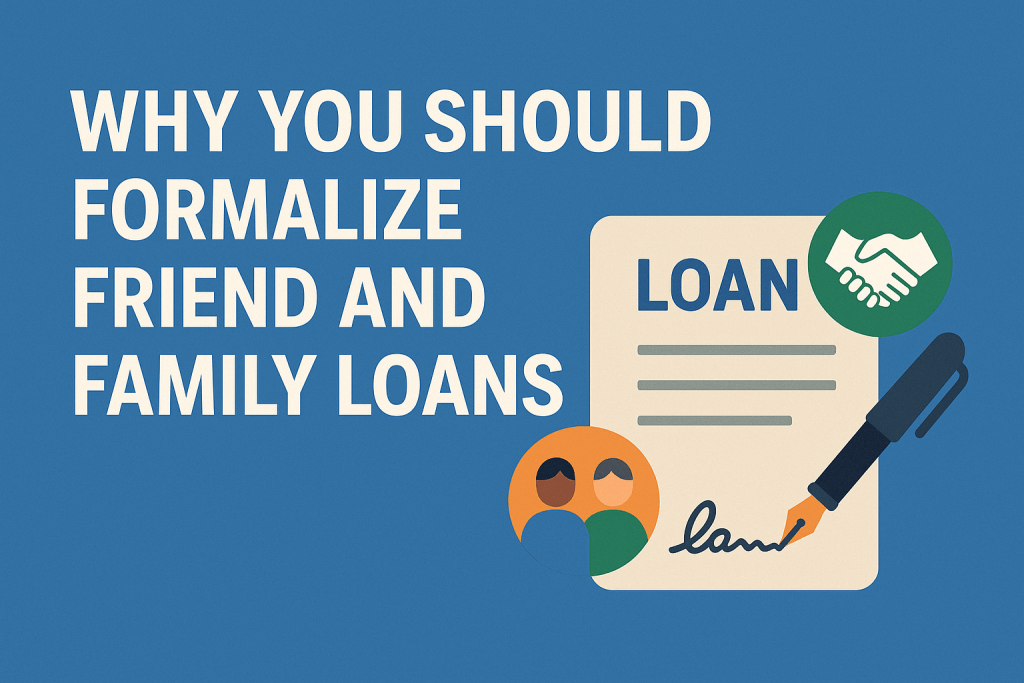Borrowing money from friends or family can seem like an easy and stress-free way to get through a financial pinch. Whether it’s to help with medical bills, cover a sudden expense, or avoid high-interest credit cards, these loans often come with trust and good intentions. But just because it’s a personal connection doesn’t mean that formalizing the loan isn’t important.
Without clear documentation and agreed-upon terms, loans between loved ones can quickly lead to misunderstandings, strained relationships, and even legal troubles. If you’re considering debt settlement or just trying to keep your finances organized, making these loans official is one of the smartest steps you can take.
Why Informal Loans Can Lead to Problems
When loans between family or friends are made without paperwork or clear terms, it leaves too much open to interpretation. What was meant as a temporary loan can turn into resentment if repayment expectations aren’t aligned. Questions about interest, deadlines, or even how the money should be used can cause confusion.
For example, one person might assume the loan is interest-free, while the other expects some return. Or maybe the borrower intended to pay it back in a few months, but the lender thought it would be a longer arrangement. Without agreement in writing, these gaps can hurt relationships and complicate finances.
How Formalizing Loans Protects Everyone
Putting the loan agreement in writing doesn’t mean you don’t trust each other. In fact, it’s the opposite—it shows respect for the relationship and the seriousness of the transaction.
A simple written agreement outlines:
- The loan amount
- Repayment schedule
- Interest rate, if any
- Purpose of the loan
- Consequences of missed payments
This transparency helps everyone understand their responsibilities and reduces the chances of conflict.
When Debt Settlement Might Be Needed
Sometimes, despite the best intentions, financial situations change and repaying loans on time becomes difficult. In those cases, having a formal agreement makes it easier to explore options like debt settlement or renegotiation.
If you don’t have a clear contract, it can be hard to prove what was agreed upon, making debt settlement negotiations more complicated and stressful.
Legal Implications of Unwritten Loans
Many people don’t realize that informal loans can lead to legal challenges down the line. If disputes arise, courts often look for written contracts to determine the terms.
Without documentation, the lender may struggle to enforce repayment, and the borrower may face unexpected legal claims. Formalizing loans protects both sides and can prevent misunderstandings from turning into lawsuits.
Tips for Formalizing a Loan with Loved Ones
- Put it in writing: Use a simple contract template or online tools tailored for personal loans.
- Be clear and realistic: Agree on terms everyone can meet without hardship.
- Keep communication open: Discuss any changes or difficulties as soon as they arise.
- Consider interest: Decide together if interest will be charged and at what rate.
- Document payments: Track all payments made to avoid confusion later.
Maintaining Healthy Relationships
Money can strain even the closest relationships. Formalizing loans helps maintain trust and respect by setting expectations upfront.
Being clear and fair shows that you value both the relationship and the financial arrangement, reducing emotional stress and misunderstandings.
Final Thoughts: Formalize to Protect and Respect
Loans between friends and family are acts of kindness and support. However, without formal agreements, these good intentions can backfire.
Taking the time to formalize the loan protects everyone involved—financially and emotionally. It provides clarity, helps avoid disputes, and ensures that relationships stay strong even when money is involved.
Whether you’re considering debt settlement or just want to keep your finances clear, a formal loan agreement is a simple step that brings peace of mind and respect to all parties.
Cassia Rowley is the mastermind behind advertising at The Bad Pod. She blends creativity with strategy to make sure ads on our site do more than just show up—they spark interest and make connections. Cassia turns simple ad placements into engaging experiences that mesh seamlessly with our content, truly capturing the attention of our audience.


